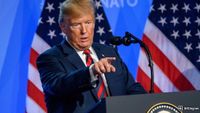Nigerian authorities claim that Binance has not acquired a license allowing it to operate in the country.
Nigeria's regulatory body, the Securities and Exchange Commission (SEC), has cautioned its domestic investors about trading on Binance, one of the leading global crypto exchanges.
The warning follows a previous circular concerning a fake enterprise illegally exploiting the Binance brand.

Did you know?
Want to get smarter & wealthier with crypto?
Subscribe - We publish new crypto explainer videos every week!
How Do KYC & AML Work in Crypto? (Explained)


The SEC declared an explicit warning for investors about Binance on July 28th. They emphasized that the crypto trading platform lacks a legitimate license to operate in Nigeria, thereby making its activities illegal.
The regulator also highlighted the substantial risk and the potential for complete loss associated with such investments. The SEC issued a clear reminder:
Any member of the investing public dealing with the entity, making such solicitation is doing so at his/her own risk.
Earlier in June, the SEC distributed a similar warning about Binance Nigeria's activities. While bearing the same name, Binance Nigeria turned out to be an illegal entity with no links to Binance.
Following SEC's warning, the actual crypto exchange Binance send a cease and desist notice to Binance Nigeria.
Despite the push for its central bank digital currency (CBDC), the eNaira, Nigeria continues to maintain a wary approach to the broader crypto industry. Although eNaira was launched in 2021 with high expectations, adoption rates have not met the forecasted projections.
As a result, the central bank has been exploring various strategies to boost its usage, with one such effort being the July upgrade to the CBDC system with near-field communication technology to facilitate contactless payments.
It is worth noting that in May, Nigeria implemented a 10% tax on profits from digital asset transactions, including cryptocurrencies. This decision drew criticism from local stakeholders who termed the tax imposition as "premature."






















